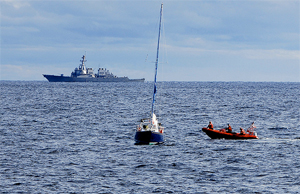Yes, this is a music post, but first, a related diversion: For most of the past week, MoJo‘s Mac McClelland has been reporting from the Louisiana coast, where blobs of crude roughly the size of Ruth Bader Ginsburg have begun washing ashore, courtesy of British Petroleum. You should follow Mac on Twitter, but the short story is this: BP—the foreign corporation which has now unleashed as yet incalculable damage on the economy and ecosystem of the Gulf Coast—has essentially taken over the town of Grand Isle, setting up checkpoints and restricting reporters’ access to [petroleum-soaked] public beaches. (They’ve also, apparently, been telling the locals that the crude blobs were really just big clumps of mud). You don’t have to be an ophthalmologist to be a little uneasy with that situation.
All of which brought to mind the last time a band of Britons attempted to occupy a slice of Louisiana: The 1815 Battle of New Orleans, in which a scrappy All-American cast of militia, Choctaw Indians, and local pirates (!!) trounced a 10,000-strong British invasion force a few miles outside the city. If it weren’t for the muskets, it’d basically be the plot of every Disney movie in the last 15 years. The parallel to today is admittedly rather thin, but the event did lead to one of the great folk song successes in American history, “The Battle of New Orleans,” which improbably shot to near the top of the Billboard Charts in 1959. It’s not entirely clear why the song would take off at such a random point in time; it’d be a bit like if Lil Wayne composed a song about the sinking of the U.S.S. Maine. But it was recorded, and it did take off. Then Johnny Cash recorded a cover of it, which is awesome. So did Dolly Parton, which is less so.
Anyways, someone on the Internet has taken the time to produce this stop-motion music video, reenacting the battle using Legos, and set to the tune of Johnny Horton’s original soundtrack. It’s kind of great. My only quibble is that, given the abundance of terrifying swamp monsters from Louisiana they could have chosen, why’d they pick the non-native war elephant (1:53)? Was that a metaphor? Have at it in the comments.
















